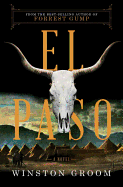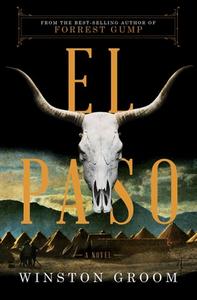
 Alabama novelist and historian Winston Groom hit the jackpot when his 1986 novel Forrest Gump was turned into an Academy Award-winning movie. After that, he shifted his focus to nonfiction, exploring subjects such as the Civil War (Shiloh, 1862), military history (A Storm in Flanders), and even a history of his alma mater (The Crimson Tide). With El Paso, Groom combines his love of history with a mature talent for well-paced storytelling. Blending historical figures and events with fully formed fictional characters, it takes the early unconventional style of Forrest Gump to a richer, more rewarding level. Set along the United States/Mexican border in the early 20th century, El Paso is the saga of a Boston railroad baron's financial slide as he tries to save his family's business and its vast cattle ranch in the state of Chihuahua in the face of the nascent uprising of Mexico's populist revolution.
Alabama novelist and historian Winston Groom hit the jackpot when his 1986 novel Forrest Gump was turned into an Academy Award-winning movie. After that, he shifted his focus to nonfiction, exploring subjects such as the Civil War (Shiloh, 1862), military history (A Storm in Flanders), and even a history of his alma mater (The Crimson Tide). With El Paso, Groom combines his love of history with a mature talent for well-paced storytelling. Blending historical figures and events with fully formed fictional characters, it takes the early unconventional style of Forrest Gump to a richer, more rewarding level. Set along the United States/Mexican border in the early 20th century, El Paso is the saga of a Boston railroad baron's financial slide as he tries to save his family's business and its vast cattle ranch in the state of Chihuahua in the face of the nascent uprising of Mexico's populist revolution.
El Paso is a rough-and-tumble saga of big egos, violence and duplicity. Pitting the fictional protagonists John "Colonel" Shaughnessy and his adopted orphan son, Arthur, against the popular Mexican bandit Pancho Villa, it has the drama, coincidence and class intrigue of Dickens's Great Expectations in a setting reminiscent of Larry McMurtry's Lonesome Dove. Groom's novel also features the mysterious cynical curmudgeon Ambrose Bierce ("War and cruelty apart, it's no longer a laughing matter to be a member of the human race"); idealistic newsman John Reed, who observes, "These were amazing people... perfect peasants... peaceful men in real life, salt of the earth, roused to revolutionary fury"; cowboy movie star Tom Mix; ex-Buffalo Soldier Henry Flipper; and a host of cameos from the likes of Mabel Dodge, Woodrow Wilson, William Randolph Hearst ("Now, that man knows how to start a war"), George Patton and John "Black Jack" Pershing. Reflecting the historical zeitgeist, Groom scatters archival tidbits throughout his story--the engineering of single-wing airplanes, railroad technology and economics, Aztec mysticism and the Colonel's political nemeses: "the infernal federal income tax, Mexico, socialism, unionism, anarchism, trustbustingism, notions of alcohol prohibition and women's suffrage."
In Groom's capable hands, this history mixes easily into what is at its core a story of family, class warfare, loyalty and the violence of revolution. El Paso's plot rolls along through gun-battles, lynchings, kidnappings, a makeshift bullfight and a cattle drive--in the context of Mexican food, culture, religion and politics. But it is also the story of the United States on the cusp of world dominance, with themes of immigration, wealth, self-determination and entitlement balanced against a strong sense of compassion and fairness. The nexus of these worlds is the border city of El Paso. In Groom's imagined history, both sides of the Rio Grande have their dangers and rewards. --Bruce Jacobs, founding partner, Watermark Books & Cafe, Wichita, Kan.
Shelf Talker: An epic saga set along the Mexican/United States border, El Paso mixes history with a Dickensian story of family wealth, class conflict and the Mexican revolution.

